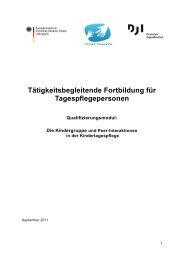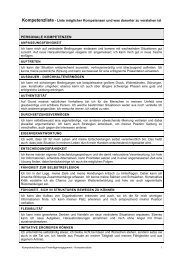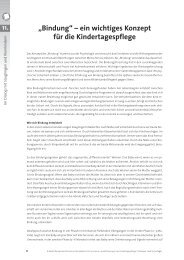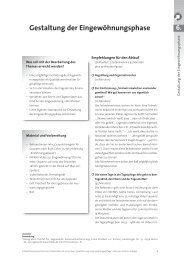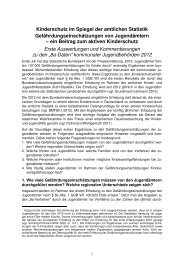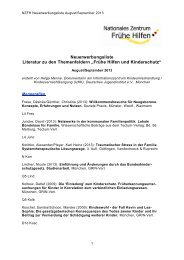download - Deutsches Jugendinstitut e.V.
download - Deutsches Jugendinstitut e.V.
download - Deutsches Jugendinstitut e.V.
Create successful ePaper yourself
Turn your PDF publications into a flip-book with our unique Google optimized e-Paper software.
In the Czech Republic and Lithuania, children and young persons in Roma families are<br />
living in particularly poor conditions. Programmes for the integration of ethnic minorities<br />
(Roma) into majority society form the focal point of national strategies in these two<br />
countries: direct activities with Roma children and young persons and their families.<br />
Management<br />
The socialistic history continues to have an effect predominantly in the management of<br />
programmes and support strategies.<br />
In Hungary and Poland, programmes initiated on a national level are controlled on a<br />
decentralised and/or local level. In Poland for example, 16 regional coordinators were<br />
recruited from the central state administration. Structures as found in Western countries<br />
which are involved in the programme implementation and work in cooperation with the<br />
regional coordinators or with the national level do not exist.<br />
In Lithuania, the programme is centrally controlled by the Department for National<br />
Minorities which initiates and coordinates the implementation of integration programmes.<br />
In the Czech Republic, programmes are controlled by two central committees which are<br />
located within the government: the council for Roma affairs and the council for national<br />
minorities.<br />
In all four countries, the programmes are implemented in a top-down manner with little<br />
participation. The reasons for the lack of a bottom-up activities and/or the low social<br />
participation lie in the socialistic past of these nations which created a totally different,<br />
more centralistic and paternalistic understanding of democracy. As civil societies in these<br />
countries are still in the early stages of development, the corresponding institutional<br />
foundations which could encourage and channel existing commitment within social areas<br />
have not yet developed. For this reason, there are few civil society actors and independent<br />
bodies available for the implementation of state initiated programmes. The development of<br />
both the civil societies themselves and the establishment of the civil society institutional<br />
structure is a long-term process which must also receive increased support from the EU via<br />
programmes for the development of democracies and civil societies.<br />
Duration of implementation of the strategy/programme<br />
As yet, the implementation of programmes for the improvement of the living<br />
circumstances of children and young persons in Eastern European countries does not have<br />
a long tradition. The programmes presented above were initiated in the middle of the year<br />
2000. The duration of the programme in Hungary is from 2005 to 2007, in Poland from<br />
2006 to 2008 and in the Czech Republic from 2006 to 2008. In Lithuania, the integration<br />
programme has been designed to run over a longer period from 2005 to 2010. During the<br />
conference it was not made absolutely clear whether these programmes and topics were to<br />
be continued. For Hungary, a statement was issued that a continuation of support is<br />
intended in the case of a positive programme evaluation. In the Czech Republic, this<br />
programme is integrated into the national action plan (The Decade of Roma Inclusion<br />
2005-2015) and is thereby guaranteed a longer-term continuation.<br />
117



